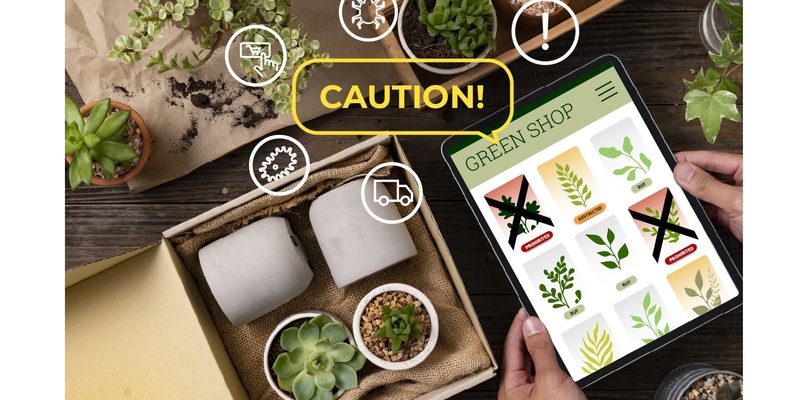Revamped IPPC webpage to serve as hub for resources on e-commerce and plant health
Posted on Thu, 14 Mar 2024, 07:05

Every second, e-commerce generates about 5 000 new parcels moving around the world by mail or courier. The exponential increase in buying and selling goods over the internet has resulted in a surge in small parcels moving on postal and courier pathways. Parcels containing plants, plant products, and other regulated articles such as soil may be a pathway for the introduction and spread of plant pests, particularly if they do not meet the phytosanitary import requirements of the importing destination country. These pests may threaten cultivated and wild plants, disrupt international trade and impact food production chains.
To increase the availability and access to information and resources on mitigating the pest risk associated with the movement of small parcels, the International Plant Protection Convention (IPPC) Secretariat has revamped its e-commerce webpage on the International Phytosanitary Portal (IPP).
The e-commerce webpage aims to provide national plant protection organizations (NPPOs), Regional Plant Protection Organizations (RPPOs), and other plant health partner organizations, with information on the topic, to assist them in making decisions to protect plants from pests that may spread through e-commerce. The webpage provides valuable information, best practices and practical guidance related to e-commerce and how to minimize impacts on agriculture and natural ecosystems.
The e-commerce webpage consolidates essential technical resources and tools and serves as a one-stop hub for easy access to the recently published IPPC guide, E-commerce: A guide to managing the pest risk posed by goods ordered online and distributed through postal and E-commerce A guide to managing the pest risk posed by goods ordered online and distributed through postal and courier pathways; and a new infographic video that illustrates how various national and international stakeholders – including NPPOs, customs officials, mail and courier services, and online buyers and sellers – all play a key role in managing the pest risk posed by e-commerce. The video is available in English, with subtitles in Arabic, Chinese, French, Russian and Spanish.
Over the coming months, the IPPC Secretariat will be coordinating several activities to promote management of the pest risk associated with e-commerce. At the Eighteenth Session of the Commission on Phytosanitary Measures (CPM-18) in April 2024, there will be a side session to discuss this topic. This side session will be livestreamed. In addition, e-commerce will be a key theme during the upcoming International Day of Plant Health on 12 May 2024 at FAO Headquarters in Rome. More news features and articles will be published focusing on case studies.
Melisa Nedilskyj, Secretary of the Comité de Sanidad Vegetal del Cono Sur (COSAVE), one of the RPPOs for South American countries, underscores the critical need for NPPOs and RPPOs to familiarize themselves with the intricacies of e-commerce operations.
"Understanding these dynamics is essential for developing effective control and monitoring mechanisms for products capable of disseminating plant pests," she says. Nedilskyj emphasizes the importance of collaboration with regulatory bodies such as customs, postal services, and online e-commerce platforms to effectively manage pest risks.
As a member of the Implementation and Capacity Development Committee (IC) representing the RPPOs, Nedilskyj highlights the critical role that awareness-raising plays in preventing the spread of pests and "encourages the phytosanitary community to promote the use of the new IPPC E-commerce guide, which provides relevant information, as well as case studies illustrating how NPPOs are addressing this issue." She adds that soon, this guide will be also available in Spanish.
"E-commerce has and continues to offer an expedited channel to send and receive goods from various destinations around the world. However, this grand opportunity also comes with challenges that include the possibility of being a pathway for pests to potentially spread through the purchase and sell of plants and plant products", said Osama El-Lissy, IPPC Secretary. "The IPPC Secretariat is committed to supporting the global community in raising awareness about the phytosanitary risks associated with e-commerce and supporting contracting parties and national plant protection organizations to protect plant resources and plant health around the world" he added.

